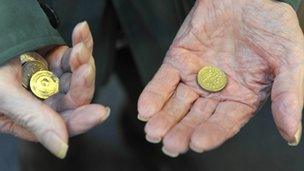New ways of caring for elderly people
- Published
BBC Inside Out looks at some radical solutions to the problem of funding elderly care in the future
New and imaginative ways of caring for elderly people are springing up across England - with claims it is necessary because politicians are "scared" of raising taxes to pay for it.
With people living longer, caring for them in their latter years is going to cost the state billions.
But the political debate is about cuts and austerity - not caring for the old.
Former Labour minister David Blunkett, now chairman of the Centre for Social Justice, said: "It isn't ridiculous to suggest that we should use the tax system progressively to look after and care for people in old age.
"[But] it's ridiculous politically because nobody will touch it with a barge pole.
"People are scared of arguing about tax and spend.
"They're scared of the consequences at the moment of the economic impact of course - in terms of further depression of our economy."
'Care insurance'
With cuts widespread, communities across England are looking for ways to fill the gaps in elderly care.
Communities, neighbourhoods and families have been establishing projects that aim to enable pensioners to feel confident they will be cared for as they age - regardless of their financial situation.
In York, the Joseph Rowntree Foundation charity has established Hartrigg Oaks, a home for pensioners and elderly people.
The idea is that residents move in when they are still fit and healthy, for instance in their 60s.
They pay money into a communal pot - approximately £170 per month for a 60-year-old.
This guarantees them nursing care free of charge if and when they need it - thus avoiding the potentially crippling care fees many older people pay.
Jennifer Mitchell moved into her bungalow there at the age of 61.
She said: "We came here because my parents had died and suddenly we were the oldest people in our family.
"We came here and suddenly we were the youngest - there were people 40 years older than me."
Health Minister Norman Lamb MP defends the quality of elderly care
Husband John Mitchell said: "You're paying effectively care insurance.
"You pay the same sum, effectively year on year, with small increases which covers your care, however much you need.
"When you're fit, OK you pay over the odds, when you need major care you don't pay a penny more for it."
Another idea - already popular on the continent - is the homeshare.
An NHS carer moves in permanently and rent free with an old person who needs help.
In return they perform 10 hours of help a week.
Iona Anderson, who lives in Wickford, Essex, has been cared for by 45-year-old live-in NHS worker Graham Allen for the past two years.
He helps her with the shopping and does odd jobs around the house.
She said: "He has been absolutely amazing - he's given me my life.
"My quality of life has risen like that - we laugh, he makes me roar with laughter."
'Carried out in my coffin'
Mrs Anderson, whose husband died in 2002 and who has rheumatoid arthritis, went on: "I desperately wanted to stay here [at home].
"I love my house - I intend to be carried out in my coffin from here."
Meanwhile on the Isle of Wight, a social experiment intends to help the younger generations become part of the solution to the problems of elderly care.
The scheme, called Care4Care, invites volunteers to help care for older people.

The cost of care consumes many elderly peoples' life savings
For every hour's care they put in, the volunteers build up an hour's worth of care credit that they can keep in a timebank.
They can then use it for their own care later in life.
Lewis Jenkins, 36, has been helping care for Pearl Bradshaw, who is in her 80s.
Mr Jenkins said: "I've been coming to see Pearl for about six months now.
"I've notched up 20 hours and I would like to think that those hours are banked to go towards either helping my mother or helping myself if and when I need it."
Professor Heinz Woolf, who created the scheme, said: "I hope that over the next three years or so we will build it into quite a large national scheme.
"I hope there might be a million members."
With nearly a quarter of the UK's population expected to be over 65 within 20 years, the dilemma of who should pay for their care is a pressing issue for government.
But BBC Home Editor Mark Easton said: "In Westminster of course the talk is all about cuts and austerity - not spending billions more caring for our elderly.
"So the responsibility falls on wider society, on communities, on neighbourhoods, on families - to fill that gap and help all of us feel more confident about the prospect of growing old."
Inside Out looks at some radical solutions to the problem of funding elderly care in the future on BBC One at 19:30 BST on Monday.
- Published11 October 2012
- Published21 September 2012
- Published10 July 2012